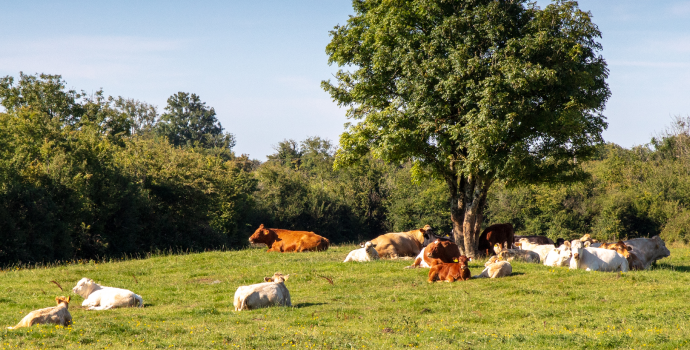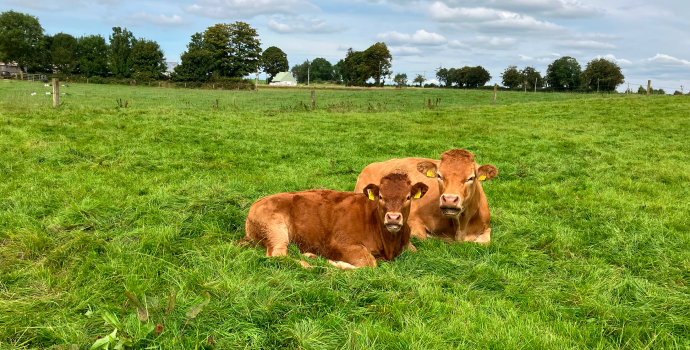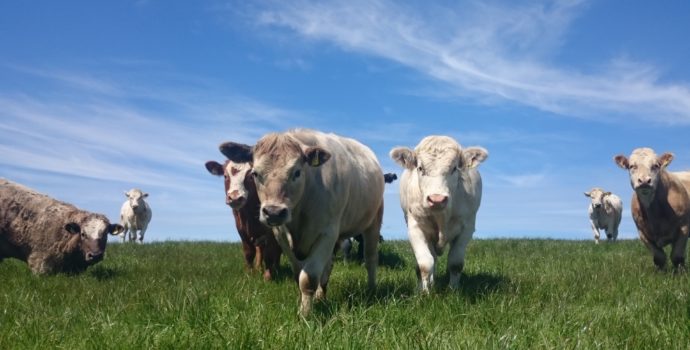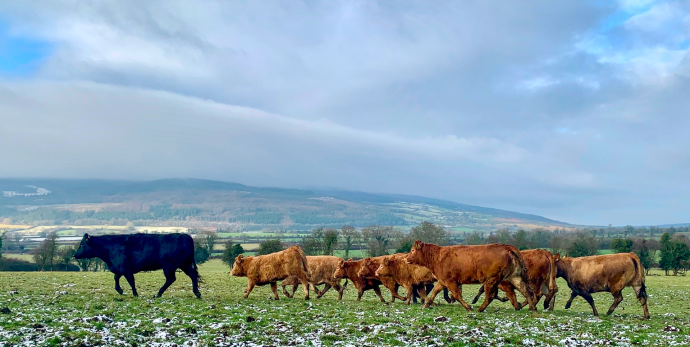Livestock Reports
Livestock Council Report September 2024
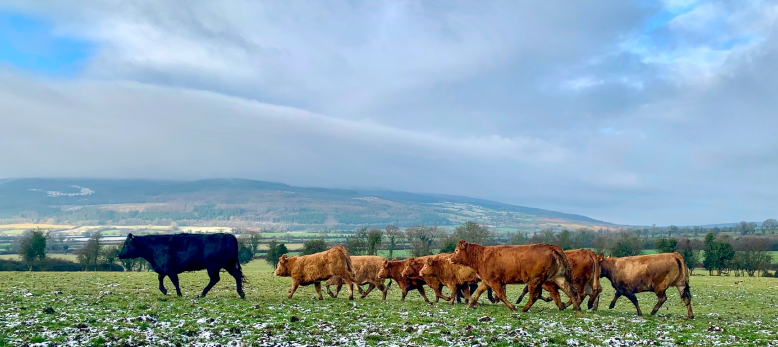
1. Market Report
Market Report
- Beef Price: Steers are making from €5.00kg to €5.30/kg. Heifers are making €5.20/kg to €5.35/kg with higher deals for larger lots and increased off season breed bonuses paid. Young Bulls are ranging from €5.25kg to €5.50/kg for R/U grades. Cows are making €4.20kg to €5.00/kg.
- DAFM Reported Prices week ending 18/08//2024: R3 steer prices for the latest increase 2c/kg to €5.24/kg, R3 heifer price increased by 2c/kg to €5.31/kg. R3 young bull prices remains unchanged at €5.20/kg. O3 grading cows are up 10c/kg to €4.51/kg, R3 grading cows are up 15c/kg to €4.90/kg.
- Composite prices: The latest Irish prime composite cattle price and the prime Export Benchmark on August 10th, 2024 were equivalent to €4.93kg and €5.05/kg deadweight respectfully.
Supply Figures as Reported by DAFM – Week 33 (18.08.2024)
| Supply Figures as Reported by DAFM – WK 17 (22.04.2024) | |||||
| Animal | Number | Change prev wk | % of total | YTD | YTD Change |
| Y Bulls | 1,049 | ▲208 | 4% | 76,904 | ▼-5,964 |
| Bull | 648 | ▲59 | 2% | 19,143 | ▼621 |
| Steer | 13,889 | ▲894 | 46% | 396,527 | ▲-13,006 |
| Cow | 6,775 | ▼-139 | 21% | 273,521 | ▲25,210 |
| Heifer | 8,304 | ▲349 | 27% | 314,067 | ▲7,179 |
| Veal-V | 16 | ▲4 | 0% | 19,714 | ▼-10,768 |
| Veal-Z | 18 | ▲-9 | 0% | 1,314 | ▲144 |
| Total | 30,699 | ▲1,366 | 100% | 1,101,190 | ▲3,416 |
- Supplies: Total throughput to date in 2024 stands at 1,101,190 head up 3,416 head from the corresponding week in 2023. Bord Bia supply forecasts for 2024 predict a 30,000 to 40,000 head or a 2% fall in the number of finished cattle available for the year. Live export demand for store and finished cattle from live exporters for NI and international markets is adding important competition to the trade and will further reduce the number of cattle available to factories in the coming weeks.
- Market Conditions: Cattle prices have risen in the past fortnight due to strong demand and the tightening availability of finished cattle supplies. Supplies have also tightened in the UK and prices have started to rise as a result. Prices in GB for R3 steers has increased 4p/kg to 4.99p/kg in the past week. R3 Heifers increased by 5p/kg to £498.7/kg for week ending August 17th 2024. EU young bull prices have steadily increased over the past three weeks and currently stands at €5.05c/kg. Outlook for beef for the coming weeks remains positive as demand continues to outstrip supply.
- Live Exports: For the first 7 months of 2024, 272,323 cattle have been exported. This is 4% ahead of the corresponding date in 2023. 194,327 Irish calves have been exported to date across the EU in 2024.This is back 3.6% on 2023 however weanling and store cattle exports are running 27% and 37% ahead of 2023 levels. Exports of store and finished cattle to NI is on par with 2023 levels.
2. Agri Food Regulator
- IFA met with the Agri Food Regulator and have sought the provision of significantly more transparency in the food supply chain between the farm gate and the consumer. IFA have called on the regulator to provide detailed analysis of beef prices at all points in the chain.
3. Review of Bord Bia Origin Green Producer Standard
- IFA continue to engage with Bord Bia on the Origin Green Producer Standard review.
- IFA have raised concerns at the direction of travel of the Bord Bia proposals in relation to all elements of the standard and of the inspection process.
- Further direct engagement with Bord Bia on the issue is planned in the coming weeks.
- IFA are seeking a simplified audit process to reduce the burden of the inspection on farmers.
4. Budget 2025
- IFA Livestock committee have set out their 2025 budget proposals as follows;
Suckler Cow Supports
- Direct supports for suckler farmers must be increased to €300/cow to provide economic viability and long-term sustainability of the sector to maintain its positive contribution to our climate target ambitions and drive of the socio economic, environmental and biodiversity sustainability of rural Ireland.
- The National exchequer €20m scheme which provides €50/cow must be extended to 2025 with funding increased to deliver an additional €100/cow in combination with SCEP to provide total direct supports for suckler cows of €300/cow
Beef Calf from Dairy herds Rearing Scheme
- There must be a Dairy Beef Calf Welfare Scheme that provides incentives for farmers to rear calves from the dairy herd. The scheme must reflect the costs, labour and standards required to maximise performance and viability of this livestock production system. Farmers who follow best practice in this area and who focus on rearing high commercial beef value (CBV) calves should be supported with a payment of €100 per calf for the rearing phase of these animals.
Beef Sustainability Scheme
- Farmers feeding animals for the second year of beef production will be required to play a pivotal role in achieving the climate target ambition for the sector. The sector is a low-income vulnerable sector that has had a significant reduction in CAP direct payments. Capacity and resources are not available on these farms to deliver the changes required to achieve the climate ambition for the sector. Farmers rearing and finishing weanling and store cattle born in suckler and dairy herds must be directly supported for this phase of the process with a minimum of €100/animal to support measures that maximise the performance of these animals. Young Bull finishers have the potential to positively impact on the average age of slaughter of all prime cattle and must be supported in this high-cost specialist production system.
5. Suckler Carbon Efficiency Programme
- A funding allocation of €52m was provided for the SCEP scheme in 2023 with a payment of €150 per suckler cow available on the first 22 cows and €120/cow on the remainder.
- 17,637 farmers are currently participating in the scheme with an average reference number of 25 cows. There are currently 441,346 cows eligible for payment.
- Farmers are required to complete an online SCEP training course by November 15th.
- There are 7 modules which all must be completed in full, together with a short quiz at the end of the modules, to fully comply with the requirements of the training. Farmers must complete all 7 modules by Friday 15 November 2024.
- The modules include; Introduction, Programme Eligibility, Breeding Strategies, Genotyping, Weight Recording, Calving Details and Surveys and Farm and Livestock Safety.
- IFA have raised concerns with DAFM regarding ease of access to the platform provided for a significant cohort of suckler farmers and sought the provision of additional means for participants to complete the training course.
- Payments for the scheme will be made in December 2024.
6. National Beef Welfare scheme
- A funding allocation of €20m was provided for a new suckler scheme in budget 2024.
- A payment of €50 per suckler cow will be available to participants of the scheme.
- The scheme actions include;
- Action 1 – Meal Feeding (Mandatory): €35 per eligible calf up to a maximum of 40 eligible calves. Participants must introduce meal feeding for a period of 4 weeks pre-weaning and 2 weeks post-weaning to reduce the stress on calves at weaning time.
- Action 2 – Vaccination (Optional):€15 per eligible calf up to a maximum of 40 eligible calves. Participants must implement a vaccination programme against clostridial diseases and / or calf pneumonia in suckler calves and record details of the vaccination.
- The scheme opened for application in August and will close on September 24th.
- 100% payments made in December 2024.
- IFA have sought the removal of the upper limit on numbers of animals eligible within a herd.
- IFA sought a resolution for farmers with Autumn born weanlings, DAFM rejected proposals to provide flexibility where Autumn born claves were sold prior to measures for the scheme being completed
7. Changes to ICBF Indices
- IFA participated in the ICBF stakeholder forum meetings in February, April, May and July to address the concerns with the new indices.
- IFA secured significant flexibilities to SCEP requirements related to the indices, ensuring no farmers are negatively impacted by the changes in November.
- Effectively animals now have the benefit of both indices to meet the criteria.
- Female calves born in herds since the new indices were published where they do not meet SCEP eligibility, these animals will be deemed SCEP eligible if the dam was 3,4, or 5 star and the sire 4 and 5 star on the replacement index. They will carry this eligibility when purchased from either a SCEP or non-SCEP herd
- Any female animals whose star rating on the September 2023 index was 4 or 5 star and subsequently dropped on the new index will retain SCEP eligibility when purchased from SCEP and non-SCEP herds for the duration of the scheme.
- The same criteria are applied for Pedigree Bulls which had a 4 or 5 star rating in the September index that dropped on the new index. These animals will retain SCEP eligible when purchased from SCEP and non-SCEP farms.
- As with the previous scheme animals that attained SCEP eligibility at any point retains this while remaining within the herd of the participant.
- The lower weights issue in the indices has also been addressed, with the minimum weight set at 520kgs at 200 days after calving which equates to a mature cow weight of 570kgs. This will now be incorporated into the indices.
- Work is progressing on the development of an index that reflects weanling production systems
- Discussions are on-going on the inclusion of carbon in the index
- IFA will continue to engage with ICBF with the objective of delivering an index that has the trust and confidence of suckler farmers and pedigree breeders.
8. On-going events
- Budget 2025.
- On-going engagement with DAFM re SCEP and Beef welfare scheme.
- Bord Bia Origin Green Producer Standard review.
- €300 Suckler cow payment, €100 rearing and finishing payment and €100 calf rearing scheme.
- Weekly publication of IFA beef price updates.
- On-going contact with Bord Bia.
- On-going contact with MII.

